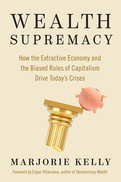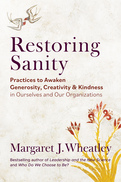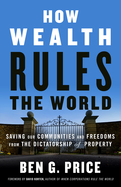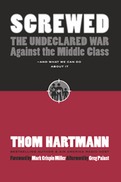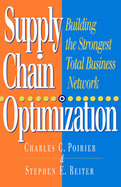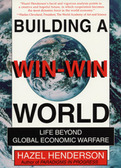2023
This bold manifesto exposes seven myths underlying wealth supremacy—the bias that institutionalizes infinite extraction of wealth by and for the wealthy and is the hidden force behind economic injustice, the climate crisis, and so many other problems of our day:
The Myth of Maximizing—No amount of wealth is ever enough.
The Myth of Fiduciary Duty—Corporate managers' most sacred duty is to expand capital.
The Myth of Corporate Governance—Corporate membership must be reserved for capital alone.
The Myth of the Income Statement—Income to capital must always be increased, while income to labor must always be decreased.
The Myth of Materiality—Profit—that is, material gain-alone is real, while social and environmental damages are not.
The Myth of Takings—The first duty of government must be the protection of private property.
The Myth of the Free Market—There should be no limits on the sphere of influence of corporations and capital.
Kelly argues instead for the democratization of ownership: public ownership of vital services, worker-owned businesses, and more. And she sketches the outlines of a nonextractive capitalism that would be subordinate to the public interest. This is an ambitious reimagining of the very foundations of our economy and society.
2024
From 50 years working with leaders globally, I state with full confidence that leadership has never been more difficult. And it's not our fault. We've been good and caring leaders, we've led people in empowering, engaging ways to create meaningful, productive work. But now we face external conditions far beyond our control to change, dynamics intensifying at shocking speed.
The perfect storm is here, created by the coalescence of climate and human-created catastrophes. As leaders dedicated to serving the causes and people we treasure, confronted by this unrelenting tsunami, what are we to do? I state my answer to this also with full confidence:
We need to restore sanity by awakening the human spirit. We can achieve this only if we undertake the most challenging and meaningful work of our leader lives: Creating Islands of Sanity.
An Island of Sanity is a gift of possibility and refuge created by people's commitment to form healthy community to do meaningful work. It requires sane leaders with unshakable faith in people's innate generosity, creativity, and kindness. It sets itself apart as an island to protect itself from the life-destroying dynamics, policies, and behaviors that oppress and deny the human spirit. No matter what is happening around us, we can discover practices that enliven our human spirits and produce meaningful contributions for this time.
Many books have been written about wealth, power and politics in the United States. Most of them make intuitive sense. Wealthy people use their power to influence and control politics. But Ben Price's new book is often counterintuitive as he explores how wealth itself is imbued with power. He answers questions such as:
How is the American Legislative Exchange Council – a modern states' rights, free market capitalist group – the intellectual and political descendant of George Washington's Federalist Party?
How was the Fourteenth Amendment that emancipated African American slaves from their status as property used by a reactionary Supreme Court to grant legal “personhood” to private corporations?
How are cities seen under our legal doctrine as “public corporations,” devoid of real governing authority?
Further, Price identifies key counterrevolutions in U.S. history that squelched the transformative potential of the Civil War and American Revolution, and traces the roots of colonial and imperial systems of control. He links them to modern “free trade” agreements and other antidemocratic structures used to supersede democracy to this day.
For some, this will come as no surprise. For others, it will be a rude, though necessary, awakening. “The white man's municipalities are just reservations, like ours,” said a resident of Pine Ridge Reservation, who Price spoke with. "The difference is, we know we live on reservations. The white man doesn't.”
Crucially, Price shares insight into how social movements can plant seeds of a new legal system that makes the liberty, civil rights and dignity of humans and ecosystems its ultimate purpose. In fact, he introduces the reader to people who are doing just that.
2007
- By the bestselling author and XM and Sirius Satellite radio host heard on more than eighty radio stations coast to coast seven days a week
- Reveals how the middle class, nurtured as the backbone of democracy by our Founding Fathers, is being undermined by so-called conservatives
- Shows how we can reverse the erosion of the middle class and restore the egalitarian vision of the Founders
- Expanded edition with a new chapter on immigration and a new afterword by Greg Palast
Supply Chain Optimization illustrates how companies that create, distribute, and sell products or services can join forces to establish a supply network with an unbeatable competitive advantage. Poirier and Reiter explain how companies can successfully employ partnering, rather than working on improvements in isolation, to identify high opportunity initiatives across a total supply network. By applying key resources on focused opportunities and sharing the resulting savings, members of the network get larger results, faster, as well as funding for future efforts.
At the heart of Poirier's and Reiter's plan is a four-step model to mobilize joint effort and focus resources from suppliers, manufacturers, distributors, and retailers on initiatives that have a high pay-back potential. The authors have studied the successes of such influential retailers as Wal-Mart, K-Mart, Target, and Sears, all of which are laying the groundwork for how to use point-of-sale data to create quick-response alliances with selected suppliers who will take responsibility for replenishing stock to predetermined levels. Supply Chain Optimization explains how to develop such effective partnering techniques and demystifies the electronic data linkages that are necessary to make them work.
Supply Chain Optimization offers survival tools for companies of all sizes. The authors describe consortiums, or "share groups," of smaller companies that can compete with the volume leverage of large corporations, superstores, and warehouse stores. By analyzing their shared supply chain and pooling their available resources, these consortiums can find hidden savings to protect their profit margins and remain competitive in today's marketplace.
The book includes case studies that show what a wide range of companies are actually doing to achieve supply chain optimization. Companies profiled include: Financing Division of General Electric, Dial Corporation, Proctor & Gamble, Baxter Healthcare Corporation, Navistar/Goodyear, Packaging Corporation of America, Dominick's, Hart Mountain Corporation, and General Motors--Saturn.
Partnering requires more than technological expertise. Successful partnerships display high levels of cooperation expressed by the sharing of resources, time, energy, and the benefits achieved. Poirier and Reiter describe the many pitfalls that must be avoided, and create a vision of how firms can build on their existing supply initiatives to gain a greater competitive advantage in today's business world.
- Helps manufacturers, service companies, suppliers, distributors, and retailers find the hidden partnership opportunities in the business relationships they already have
- Explains how true partnering techniques can generate enhancements across a total supply network resulting in savings for all members of the network, as well as funding for future improvements
- Includes action studies to show how the concepts have been implemented
- Explores current economic trends in search of ways to accelerate human development that are sustainable within the earth's ecosystems
- Examines how social innovations are finding expression in new forms of enterprise, new institutions, partnerships, and cooperative agreements that can lead to the building of a win-win world
- Offers positive approaches for concerned citizens who accept that personal development and rights bring a greater responsibility for the human family


